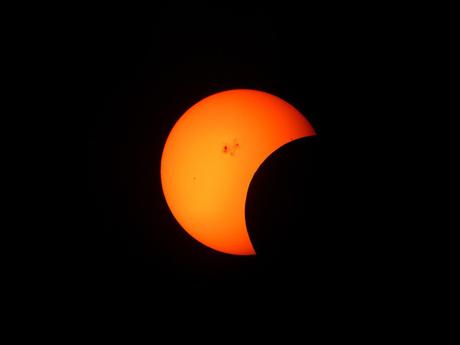
We climbed out of the car on Saturday night to a dark sea of shining stars. The night was clear and perfect, there was no light pollution to block our view. "Let's lay on our backs and look at the stars!" said my younger daughter. The 25 year-old negotiated with the 57 year-old and we opted for chairs on an upstairs balcony. We settled in and gazed upward. All those glorious stars, light years from where we were. We argued whether we saw the Big Dipper or Orion's Belt, finally laughing that it really didn't matter. What mattered were those moments of just stopping and staring at that beautiful, dark sky. Minutes passed but still we stared and talked and stared some more. There was something both glorious and deeply comforting about recognizing our smallness against the vastness of the universe.
The sky clouded over and we went back inside, back to our evening, back to life before the stars.
Yesterday in the United States, all eyes turned from the usual sharing of outrageous news stories to stories and video footage of the eclipse of the sun. It was a refreshing change.
This was history in the making and I would not miss it. I followed the clock and knew that in Boston the moon would cross the sun around 2:40 in the afternoon. I almost missed it. I was at a meeting when my eye glanced at the bottom of a computer screen and saw the time. I jumped up. "It's the eclipse!" I said. I rushed out of the room and my colleagues told me I had missed some of it. "But it's not too late! They're sharing glasses downstairs. Go. Run."
The collective enthusiasm propelled me quickly downstairs. In front of our building was a crowd passing around a couple of pairs of glasses. Someone passed them to me. I put them on and I looked up.
It was amazing. We were not in the line of totality and the day was bright around us, but still, looking through those dark glasses and viewing the eclipse was incredible. The sun looked like a bright crescent moon in a dark sky. I watched as the crescent moon sun got smaller and then grew bigger and bigger. I passed off the glasses to someone else. They went around to two more people and then came back to me. I put them on again and the crescent moon sun had become an oblong. After my third viewing I knew I needed to return upstairs, back to my meeting, back to life before the eclipse.
I am not naturally given to star-gazing or eclipse-watching. My heart bends toward daylight and sunshine. When it is dark outside I want to transform the dark into light with white lights and candles. But these two moments of star-gazing and eclipse-watching were moments that I needed. They were glimpses of glory in the midst of the mundane. They were a caution to pride and a call to humility.
Yet, even as I sat there, I knew I didn't want to sit there forever. Instead, I was ready. Ready to get back to life's normal. For how long can we sustain the glorious? In our earthly bodies we fear the glorious, fear that it will paralyze, or worse, kill us. The glorious is so far above and beyond us that we cover our eyes - if not with dark glasses, then with our hands.
In her essay "Total Eclipse", Annie Dillard writes "One turns at last even from glory itself with a sigh of relief. From the depths of mystery, and even from the heights of splendor, we bounce back and hurry for the latitudes of home."
In the book of Exodus in the Old Testament there is a chapter where Moses is having a conversation with God on Mount Sinai. He wants assurance that God will go with him; the assurance of God's presence with the people of Israel. He says to God "Show me your glory!" God responds in these verses:
"I will cause all my goodness to pass in front of you, and I will proclaim my name, the Lord, in your presence...But," he said, "you cannot see my face, for no one may see me and live." ..."There is a place near me where you may stand on a rock. When my glory passes by, I will put you in a cleft in the rock and cover you with my hand until I have passed by. Then I will remove my hand and you will see my back; but my face must not be seen."When Moses came down from Mount Sinai, people were afraid of him because his face was radiant. It reflected the glory of God.
A second-century theologian, St. Irenaeus, wrote that "the glory of God is a man fully alive." Moses was indeed a man fully alive.
Maybe, as Annie Dillard describes, if we weren't so quick to turn away from glory and run back home; maybe if we were more willing to ask God to show us his glory, and then to sit in it, we, too, would be fully alive.
Our faces would be radiant, for they would reflect the glory of God.
